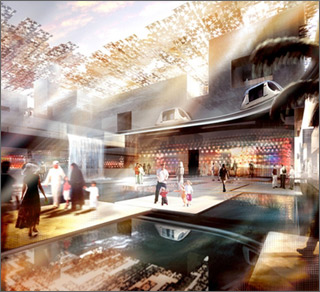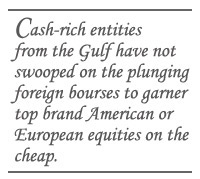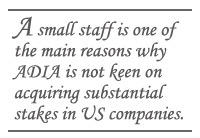Gulf to the US: Thanks, But No Thanks
Gulf to the US: Thanks, But No Thanks

research and development hub for new energy technologies; a model city center,
shown in the rendition, is set to open in 2009
LONDON: As American financial giants collapsed and blue chip corporations sent out distress signals, many on the Wall Street expected super-rich Middle Eastern Sovereign Wealth Funds (SWF) to swoop down to acquire stakes in some of them. But such thinking has proved to be a mirage. Contrary to popular perceptions in the West, these SWFs are both cautious and well-diversified. They’re also preparing for the post-petroleum era better than most outsiders imagine.
“Risk averse” aptly describes the strategy largely followed by the Gulf SWFs since their inception, despite a general opaqueness. But then, being a private investment instrument owned by the state but functioning outside its financial apparatus, with a mandate to invest exclusively or chiefly abroad, a SWF is not required to be transparent or operate within limits applied to official reserves.

These cash-rich entities have not swooped on the plunging foreign bourses to garner top brand American or European equities on the cheap. Such moves were anticipated after the unusually public investment of $7.5 billion by Abu Dhabi Investment Authority (ADIA) in Citigroup, the biggest US bank, last November, which turned the ADIA into Citigroup’s largest shareholder. In contrast, almost a year later, the Gulf SWFs did not even follow the ever-cautious Warren Buffet, the world’s richest man, when he poured capital into General Electric and Goldman Sachs investment bank.
While the Gulf SWFs have avoided investing in the US financial sector, the governments have stuck to the policy of keeping their currencies linked to US dollar. The only exception is Kuwait, which opted for a basket of reserve currencies in May 2007.
With the transparency index of 6 – 10 being the ideal, according to the SWF Institute – the Kuwait Investment Authority, with a capital base of $264 billion, is the least opaque in the region. At the other end is Saudi Arabia’s $365 billion-worth SAMA Foreign Holdings, with the transparency index of 2.
A little less opaque is the ADIA. Yet, by all accounts, it’s the richest since the Emirate of Abu Dhabi produces nine out of 10 barrels of United Arab Emirates oil. Until the recent meltdown in stock markets, ADIA’s capital base was estimated to be around $1 trillion.
Amazingly, such a super-affluent fund, housed in a shark-blue glass tower, has only 1,100 employees, all based in Abu Dhabi, except two dozen in London.

Its small staff is one of the main reasons why ADIA is not keen on acquiring substantial stakes in US companies. It does not have enough personnel to dispatch to safeguard its interests abroad. Equally important, its top managers remember the controversy in 2006 that erupted when the UAE-based Dubai Port World acquired the British-owned Peninsular and Oriental Steam Navigation Company (P&O), which included management contracts for six US seaports.
The resulting protest based on perceived threat to America’s national security, culminating in US Congress opposing the new deal, compelled Dubai Ports World to sell its US management contracts to American International Group's division, Global Investment Group.
Also fresh in Gulf SWF managers’ minds was the Bush White House’s opposition to the acquisition of Unocal, an American oil company, by China National Offshore Oil Company (Cnooc), which was later purchased by Chevron on less favorable terms to Unocal shareholders.

Wedded to operating in an extremely discreet fashion, the Gulf SWFs are particularly wary of the public scrutiny that follows acquiring a substantial stake in a reputed US corporation. “We have no particular preference for US stocks and shares,” an ADIA manager in Abu Dhabi told me. “Our analysts follow the markets throughout the world, both the developed ones and the emerging ones.” He would not divulge the breakdown between US and non-US equities. But a business reporter of the Gulf News, the region’s most popular newspaper, put the ratio at roughly 50:50.
ADIA’s modest investment in Citigroup has proved disastrous, with the equity falling from $31 a share that it paid to a low of $13 a share. Another regional investor in Citigroup, the KIA, suffered as well. Its investment in Merrill Lynch also proved unwise when that New York–based investment bank fell on bad times and was taken over by Bank of America.
With bourses falling worldwide, Gulf SWF managers explored opportunities outside the US. For instance, SAMA Foreign Holdings is in the process of buying agricultural land in Pakistan and Thailand to produce food grains for the Saudi kingdom.
In the region, the Investment Corporation of Dubai (ICD) – a successor to the Finance Department’s Investment Division – stands out. The Emirate of Dubai has little oil, with only 6 percent of its revenue stemming from it. ICD’s primary investments have been in the real estate and infrastructure projects.
Maktum ibn Rashid al Maktumm, Dubai’s ruler until his death in 1990, had the foresight to plan for the post-oil era by turning his emirate into a tourist destination, gigantic shopping mall and vast tax-free port.
So, today the Dubai Emirate of 1.5 million hosts more than a million tourists from Britain alone. Its Dragon Mart, located inside a 2-square-mile compound and built in conjunction with the Chinese government, houses 3,000 retail and wholesale outlets, and draws customers from neighboring principalities and countries.
Dubai’s tax-free Media City has become a regional hub for news agencies, publishing, online media, advertising, production and broadcast facilities. Next to it is Dubai Knowledge Village. Both abut Dubai Internet City, an information technology park where wholly owned foreign companies are operating.
Other emirates and states have followed Dubai’s lead to ensure prosperity after oil and natural gas run out. The mix includes not just tourism, shopping, media and knowledge centers but also museums on the scale of the Louvre and Guggenheim, and year-round regional and international conferences and sports events. Moreover, oil-rich Saudi Arabia and UAE are investing in the exploration and development of future energy sources, clean technology solutions and other projects to cut global pollution.
Under its $15 billion Masdar global initiative, inaugurated in 2006, Abu Dhabi Future Energy Company is mandated to discover advanced solar technologies. Its photovoltaics and concentrating solar power schemes involve setting up a large polysilicon factory in Abu Dhabi to supply feedstock for the photovoltaic cell and module manufacturing. The Masdar initiative is also funding research in thin-film photovoltaics, spherical photovoltaics, beam-down solar towers and thermal storage for solar power.

During President George Bush’s visit to Abu Dhabi in January, his hosts unveiled a model of Masdar City – the globe’s pioneering zero-carbon, zero-waste, car-less city – scheduled to be ready by late 2009 in the desert sands of the Emirate. The irony of the occasion was lost on Bush, whose presidency has been marked by disdain for reducing global pollution.
At the oil summit in Jeddah in July, Saudi King Abdullah let British Prime Minister Gordon Brown announce that the kingdom had agreed to cooperate financially with Britain to develop and deploy technology for carbon capture. According to the UN Intergovernmental Panel on Climate Change, the CO2 capture-and-storage system could provide up to 55 percent of the emission reduction needed to avoid the worst effects of global warming.
In sum, the possession of untold riches has not led the Gulf SWFs to become either reckless or shortsighted.
Dilip Hiro is the author of “Blood of the Earth: The Battle for the World’s Vanishing Oil Resources,” published by Nation Books, New York; Politico’s Publishing, London; and Penguin Books, New Delhi. Click here to read an excerpt.